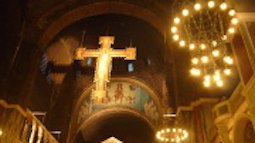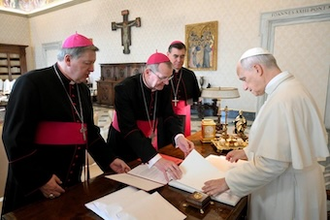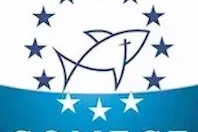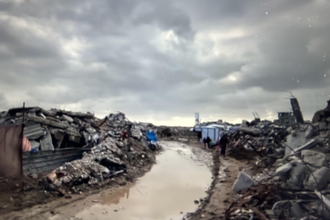Text: Polish Primate at Westminster Cathedral Mass for centenary of Polish independence

Westminster Cathedral - image ICN
Source: Polish Catholic Mission
Archbishop Wojciech Polak, Primate of Poland, gave the following homily yesterday at Westminster Cathedral at a special Mass on the eve of Polish Independence. Cardinal Vincent Nichols. Mgr Stefan Wylezek, Vicar Delegate for the Polish Catholic Mission to England and Wales and Mgr Wladyslaw Wyszodawski Vice Rector concelebrated the Mass.
Dei providentia, populi constantia - Polonia restituta!
Your Eminence, Most Reverend Cardinal,
Dear Brethren in Priesthood,
Members of the Institutes of Consecrated Life and Societies of Apostolic Life,
Representatives of the Public Sector,
Mr Ambassador,
Beloved in the Lord, Brothers and Sisters,
• We are gathered here today, in Westminster Cathedral, on the eve of the 100th anniversary of Poland regaining its independence, to pray for our country.
As Saint John Paul II noted, "Poles, wherever they are in the world, generally retain the bond with their homeland through the Church, through the memory of Our Lady of Częstochowa, through our Patron Saints, through all those religious traditions that have sustained our nation for a thousand years, and are still alive today".
Our collective memory, the memory of all of us, and also those living here in Great Britain, is the witness to this special bond with our homeland, with Poland, and so is our gratitude to God and to people, for making our country, a hundred years ago, free and independent again, after years of partition and oppression.
St John Paul II during his memorable UNESCO speech said, that during partition and occupation, we retained "our own identity and sovereignty as a nation, surviving thanks to no other power than our own culture which, in this case, proved mightier than those other powers". For in no other way but this, thanks to our faith and culture, thanks to the nurturing of our memories and our identities, were we able to survive the partition. By showing respect and cultivating the feeling of community amongst all citizens, regardless of their faith and background, we retained the spirit of Polishness in our hearts.
We retained the spirit of our nation and our love of independence and thus, making use of the pivotal moment in history, we announced to the world: Dei providentia, populi constantia - Polonia restituta. For when we look at regaining our independence a hundred years ago through the prism of our faith, we can see that event in the light of the Providence of God, in the light of God himself, who, as we have sung in today's psalm, "reigns for ever and ever, through generations". This is why the first Primate of the resurrected Poland, who ascended to the Primatial See in Gniezno at the time when the First World War was still continuing, being aware, as he wrote in his first pastoral letter, "of the historical clock striking the hours that will greatly affect the destinies of peoples and nations (…)", explained that this was "clearly the hand of God, drawing mysterious signs, unclear to us as yet, foretelling the transformation of the world". Primate Dalbor added that "what God willed to disappear, will be destroyed, what God willed to rise to life and survive, will rise up and prevail". He hoped that "we all become worthy of this historic moment. May we all, through the purity of our hearts, clarity of our minds and eagerness of our good will, be worthy to have life, and have it to the full (J 10, 10), and fulfil God's word on earth throughout history".
• Beloved in the Lord, Sisters and Brothers! The stories of the two widows recounted in today's Liturgy - the widow from Sarepta and the poor widow from the court of the Jerusalem Temple - remind us that the faith and hope we place in God must be coupled with making wise and brave decisions, with real engagement and actions, with a tangible response we give to God and to people.
The stories of those two biblical widows seem to show us the two sides of the same coin. We must not stop at just one of them. We must not reduce the entire message to highlighting one reality only. For it is not possible to live truly in just one of these realities. Placing faith and hope in God and entrusting our lives to God's Providence are intricately linked, as they must be, with the awareness, as we are reminded in the Catechism of the Catholic Church, that "to human beings God even gives the power of freely sharing in His Providence by entrusting them with the responsibility of "subduing" the earth and having dominion over it." By asking, as the Catechism also tells us, for almost 'childlike abandonment' to his Providence, God does not replace us or relieve us from acting responsibly and bravely.
"Intelligent and free creatures", the Catechism of the Catholic Church tells us, "have to journey toward their ultimate destinies by their free choice and preferential love." For we are not some passive puppets in the hands of God. We are not simply dependent on blind fate, either. We are not passively subjected to the world history and its turbulent events. As humans, we have the freedom to influence them. We have the choice about how we live and how we nurture and look after the common good. "God created us free. Therefore the freedom is within us." As free individuals we can and do therefore participate in human history, we are responsible before God for its ultimate shape and progress. We are a part of it. It belongs to us and it depends on us. It is true however, as Pope Francis reminded us at Jasna Góra, "this requires strong faith and trust in Him, who rules the fate of nations, opens closed doors, transforms obstacles into opportunities and creates new scenarios where it seemed impossible."
What is also required is our bravery and trust in our human endeavours, patience and perseverance in searching for new opportunities. Our concerns and efforts for Poland are still required today, as they were a hundred years ago when she resurrected with explosive strength, for the paths to her independence were many and varied, and along the way, despite the differences in our visions for her future, our love for an Independent Poland prevails.
Amongst many testimonies of our road to independence, some written during the First World War, are testimonies to the actions of eminent Poles, the Fathers of Polish independence. Amongst these testimonies I have found tales of the engagement of numerous Polish centres abroad, in Lausanne, in Vevey, in Paris and also here, in London, where The Polish Information Committee published the Polish Review.
All of this has once again demonstrated the populi constantia, the unshakable conviction and actions of Poles, which just as in the case of the biblical widow, reflected, even more than the human generosity or sacrifice, charity or magnanimity, their trust and hope and an intense, unshakable conviction that they must take advantage of the historic moment. And perhaps at the same time we began to discover within us the evangelical truth that there is more happiness in giving of oneself, in offering of oneself what we can, than in receiving.
• Beloved in Christ, Brothers and Sisters! The heroines of today's Liturgy, the widow of Sarepta and the poor widow of Jerusalem have shown us how our trust in God's Providence and our consistent actions bear blessed fruits. Despite the difficult and truly extreme conditions in which they had to make such important decisions about their lives, and in the case of the first widow also bearing responsibility for others, they have shown us, as someone so beautifully said, that God will not reject an empty hand, but will embrace it. God did not let them perish.
The gesture of kindness and the trust they showed in God lay grounds for their everyday certainty. For the widow of Sarepta, it became the main principle of her daily life. The jar of flour was not exhausted and the jug of oil did not run dry (…) and that occurred every day. In the crowds of people walking around the temple court in long flowing robes or dresses decorated with elaborate tussles, in all the noise of voices shouting out large sums offered by the rich to the temple treasury, among the rich people accustomed to taking the best seats in synagogues and places of honour at banquets, Jesus saw a poor widow. He noticed that she had literally offered everything she had to live on, she truly risked her own life.
The freedom and independence of our Homeland that we commemorate today is not limited merely to sovereignty and the independence from external factors, from others. Independence is not just defined by state sovereignty, social structures or human rights protection, although these factors express and serve it well. Freedom is much more than that - it is, as highlighted in the message of the XI Congress of Gniezno, choosing to live your life for others. Freedom therefore means devotion in the service of the common good.
Freedom means love and mercy.
Freedom means engagement for the benefit of common good, caring for the weakest and the destitute who need tangible help and support.
We are tested on it every day wherever we lead our daily lives.
And this is why, as the document of Christian form of patriotism instructs us, patriotism, the love for one's country, calls for mutual kindness, solidarity, honesty and the development of common good. The love for our country calls on us to respect the rule of law and each other. It calls on us to open our hearts to others, to include, not exclude, to unite, not divide, to accept, not reject. If the truth is, as the Polish Bishops noted in their document of Christian form of patriotism, that in the times of subjugation and the struggle for independence it was our Polish patriotism that showed openness and solidarity with others, then for all of us, all Poles both at home and abroad, to commemorate the 100th anniversary of our independence well, we should pledge to be even more open to each other and to live in accordance with principles of solidarity in love. We cannot allow ourselves to be slaves to egoism, including national egoism. We cannot hide behind walls built on hatred and fear.
We must acknowledge that the only life that bears fruit is one offered to others, shared with others, capable of compassion, cooperation and solidarity. At the dramatic moment in our more recent history when, after the Smoleńsk tragedy we met in prayer here, in Westminster Cathedral, Cardinal Vincent Nichols, present also with us today, referring to our national anthem, told us: Poland is not lost for as long as you live. You really live, you do. Poland is truly not lost. Those words comforted us then and gave us hope and strength.
Through our prayers today let us be filled with hope and strength. Hope for the future and strength to bear witness with our lives, amongst the British people we live, for the love of our Homeland, a love that is beautiful, creative, open and capable of mutual understanding and respect. Amen.


















